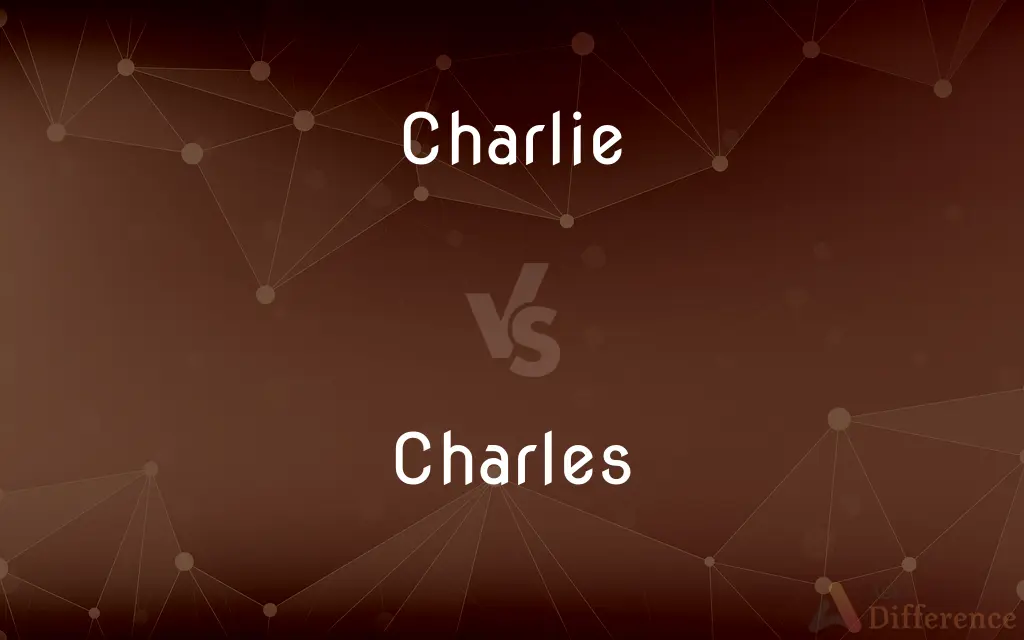Charlie vs. Charles — What's the Difference?
Edited by Tayyaba Rehman — By Fiza Rafique — Updated on April 2, 2024
Charlie is often used as a nickname or informal version of Charles, showcasing a more casual or affectionate tone, while Charles is formal and used in official contexts.

Difference Between Charlie and Charles
Table of Contents
ADVERTISEMENT
Key Differences
Charlie and Charles represent the same name but differ in their formality and usage contexts. Charles is a traditional name, derived from the Germanic name Karl, meaning "free man." It has been borne by many royals and historical figures, embodying a sense of formality and gravitas. On the other hand, Charlie is a diminutive form of Charles, often used in more informal, friendly, or familial settings. It conveys a sense of warmth and accessibility, making it a popular choice for everyday use.
The choice between Charlie and Charles can signify the relationship between the individuals involved or the setting in which the name is used. For instance, in professional or ceremonial occasions, Charles might be preferred to underscore respect or formality. Meanwhile, friends and family might opt for Charlie to express closeness and affection. This distinction is not merely about preference but also about signaling the level of formality or intimacy intended by the speaker.
In legal documents, business settings, or any scenario where formality is key, Charles is the go-to name. It’s the name that appears on birth certificates, passports, and in legal proceedings, underscoring its official status. Charlie, by contrast, might be used in social media, casual correspondence, or by those who wish to project a friendly and approachable image. This flexibility allows individuals named Charles to navigate different social landscapes, choosing the version of their name that best fits the situation.
While Charles carries with it a weight of history and tradition, Charlie brings a modern, relaxed vibe. The use of Charlie over Charles can also reflect generational preferences or cultural trends, with younger individuals or more informal cultures possibly showing a predilection for nicknames. Additionally, Charlie has grown in popularity as a gender-neutral name, whereas Charles remains predominantly male.
Understanding the nuances between Charlie and Charles is crucial in social interactions, as using the appropriate form can convey respect, familiarity, or solidarity, depending on the context. It highlights the dynamic nature of names and how their variations can impact interpersonal relationships and social identity.
ADVERTISEMENT
Comparison Chart
Formality
Informal, friendly.
Formal, traditional.
Usage Context
Casual settings, among friends and family.
Official documents, professional settings.
Implication
Conveys warmth, approachability.
Signifies respect, formality.
Historical Roots
Diminutive of Charles.
Derived from the Germanic name Karl, meaning "free man."
Gender
Increasingly used as a gender-neutral name.
Predominantly male.
Compare with Definitions
Charlie
A familiar or affectionate diminutive of Charles.
Charlie is always the life of the party.
Charles
Associated with royalty and historical figures.
Charles II was known for his patronage of the arts.
Charlie
Often chosen for its modern, approachable vibe.
Charlie's YouTube channel has thousands of subscribers.
Charles
Conveys a sense of gravitas and respect.
Attorney Charles Johnson will review the case.
Charlie
Can be gender-neutral.
Charlie is editing the community newsletter.
Charles
A formal, traditional name meaning "free man."
Charles received the award for his contributions to science.
Charlie
Suggests a friendly, casual personality.
I met Charlie at the café yesterday.
Charles
Reflects tradition and a strong identity.
Charles has been a family name for generations.
Charlie
Used informally or by younger people.
Charlie won the school's art competition.
Charles
Used in official or ceremonial contexts.
Dr. Charles Smith will be speaking at the conference.
Charlie
A familiar nickname or substitute for Charles.
Charles
Charles is a masculine given name predominantly found in English and French speaking countries. It is from the French form Charles of the Proto-Germanic name ᚲᚨᚱᛁᛚᚨᛉ (in runic alphabet) or *karilaz (in Latin alphabet), whose meaning was "free man".
Charlie
A member of the Vietcong.
Charles
The eldest son of Elizabeth II and heir to the English throne (born in 1948)
Charlie
A night watchman; - an old name.
Charles
French physicist and uathor of Charles's law which anticipated Gay-Lussac's law (1746-1823)
Charlie
A short, pointed beard, like that worn by Charles I.
Charles
A river in eastern Massachusetts that empties into Boston Harbor and that separates Cambridge from Boston
Charlie
As a proper name, a fox; - so called in fables and familiar literature.
Common Curiosities
Are there any female versions of Charles or Charlie?
Charlotte and Charlene are female variants of Charles; Charlie is increasingly used as a gender-neutral name.
Is Charlie always a nickname for Charles?
While commonly used as a nickname for Charles, Charlie can also stand on its own as a given name.
Can Charles and Charlie be used interchangeably?
They can be used based on the context; Charles is preferred in formal situations, while Charlie suits casual environments.
Can the use of Charlie over Charles indicate a cultural trend?
Yes, the preference for Charlie reflects a broader trend towards informality and casualness in names.
How do cultural perceptions of Charles and Charlie differ?
Charles may evoke traditional, dignified associations, while Charlie might be perceived as modern and approachable.
Is it common for public figures to go by Charlie instead of Charles?
Some public figures choose "Charlie" to appear more relatable and accessible to the public.
Does the meaning of the name change between Charlie and Charles?
The inherent meaning remains the same, though the connotations and implications can differ based on formality and usage.
How should I address someone named Charles?
It's best to start with "Charles" in formal settings or upon first meeting, and switch to "Charlie" if indicated it's their preference.
Why might someone prefer to be called Charles instead of Charlie?
Personal preference, professional branding, or a desire for formality could influence the choice.
Can the choice between Charles and Charlie affect personal identity?
Yes, names can significantly impact personal branding and how individuals are perceived by others.
Share Your Discovery

Previous Comparison
Sociogram vs. Sociometry
Next Comparison
Banquet vs. BanquetteAuthor Spotlight
Written by
Fiza RafiqueFiza Rafique is a skilled content writer at AskDifference.com, where she meticulously refines and enhances written pieces. Drawing from her vast editorial expertise, Fiza ensures clarity, accuracy, and precision in every article. Passionate about language, she continually seeks to elevate the quality of content for readers worldwide.
Edited by
Tayyaba RehmanTayyaba Rehman is a distinguished writer, currently serving as a primary contributor to askdifference.com. As a researcher in semantics and etymology, Tayyaba's passion for the complexity of languages and their distinctions has found a perfect home on the platform. Tayyaba delves into the intricacies of language, distinguishing between commonly confused words and phrases, thereby providing clarity for readers worldwide.
















































